高考英语作文评分标准
最新广东省高考英语作文评分标准
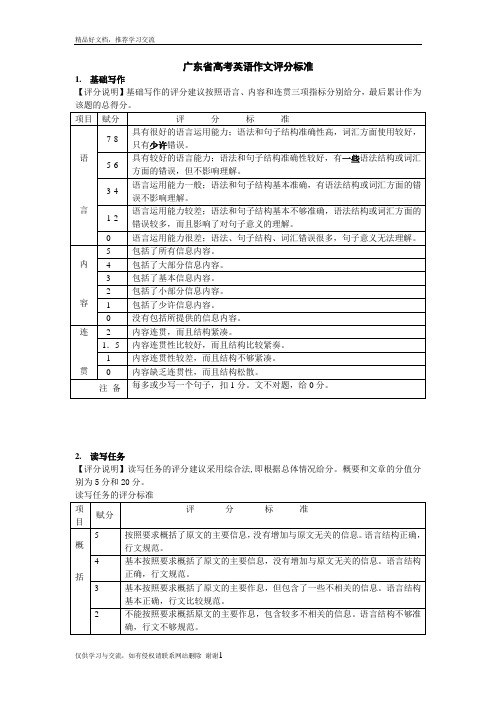
广东省高考英语作文评分标准1.基础写作【评分说明】基础写作的评分建议按照语言、内容和连贯三项指标分别给分,最后累计作为该题的总得分。
2.读写任务【评分说明】读写任务的评分建议采用综合法,即根据总体情况给分。
概要和文章的分值分别为5分和20分。
读写任务的评分标准初三物理电学综合试题及答案一、填空题(每题2分,共32分)1.电流在某段电路上所做的功,等于这段电路跟路中的以及的乘积,写成公式就是。
2.一个电熨斗,标有“220V 300W”,它的物理意义是。
这个电熨斗正常工作4小时,消耗电能千瓦时,合焦耳。
3.照明电路的电压是伏特。
在照明电路里,某个电灯正常发光时,通过它的电流强度是0.22安培,此时,灯泡的电阻是欧姆。
4.一只标有“6V 3W”的小灯泡,接在4.5伏特的电源上,它的实际功率是瓦特。
5.滑动变阻器的原理,是靠改变电路中来改变,从而改变电路中的。
6.一个导体,电阻为20欧姆,接在某一电源上,通过的电量为18库仑,电流做功108焦耳。
这电源的电压是伏特,通过导体电流强度为安培,这导体消耗的电功率为瓦特。
7.一节干电池电压是伏特,一节蓄电池电压是伏特,照明电路电压是伏特,对人体安全的电压是。
8.磁场周围的磁感线都是从磁体的出来,回到磁体的。
9.在磁场中,小磁针北极所受磁场力的方向跟该点的磁场方向。
10.直线电流周围磁感线的方向跟方向有关,它们之间的关系可以用定则来判定。
11.电磁铁的优点是:它的有无可以由通断电流控制,它的可以由电流的强弱来控制,它的可以由变换电流方向来控制。
12.在丝绸和玻璃棒摩擦的过程中,有一部分从玻璃棒转移到丝绸上,摩擦起电的实质是。
摩擦起电并没有。
13.电阻是导体的性质,我们用跟的比值表示导体的电阻,写成公式就是。
14.闭合电路的一部分导体,在磁场里做切割磁感线运动时,导体中就会产生电流,这种现象叫做。
如果电路不闭合不会产生,只在导体两端产生。
15.家庭照明电路里的保险丝是由电阻率比较而熔点比较的铅锑合金做的。
高考英语作文多少分

高考英语作文多少分高考英语作文卷面分值为25分。
但由于全国大部分省份高考都是使用全国卷,而全国卷中的30分听力是不计入总成绩的,这些省份会将除听力部分的其他科目分值由120分折算成150分,此时英语作文所占实际分值为31.25分。
高考英语的评分标准是什么?一、第五档(很好)该档次作文完全完成了试题规定的任务;涵盖所有要点;丰富的应用了词汇和语法结构;词汇拼写和语法结构应用准确,即使有较少的错误是因为使用高级句型和单词所致;具有较强的语言应用能力;合理的使用连接成分。
最终使作文完全达到了预期的写作目的,得分在21-25分之间。
二、第四档(好)该档次作文完全完成了试题规定的任务;即使漏掉一两个次重点但涵盖所有主要内容;应用的词汇和语法结构满足任务要求;词汇拼写和语法结构应用基本准确,即使有些许错误也是因为尝试使用高级句型和单词所致;简单的使用连接成分。
最终使作文达到了预期的写作目的,得分在16-20分之间。
三、第三档(适当)该档次作文基本完成了试题规定的任务;即使漏掉一些内容但涵盖所有主要内容;应用的词汇和语法结构满足任务要求;有些许词汇拼写和语法结构错误,但不影响理解;简单的使用连接成分。
最终使作文基本达到了预期的写作目的,得分在11-15分之间。
四、第二档(较差)该档次作文未恰当完成试题规定的任务;漏掉一些主要内容;语法结构单调、词汇运用有限;有一些词汇拼写和语法结构错误,影响了内容理解;较少使用连接成分。
最终使作文未能清楚的传达给读者,得分在6-10分之间。
五、第一档(差)该档次作文未完成试题规定的任务;未理解试题要求,明显漏掉主要内容;语法结构单调、词汇运用有限;较多词汇拼写和语法结构错误,影响了内容理解;缺乏连接成分。
最终使作文未能清楚的传达给读者,得分在1-5分之间。
云南高考英语作文评分标准细则2023

云南高考英语作文评分标准细则2023 English:For the 2023 Yunnan college entrance examination English composition, the grading criteria are as follows: First, the content should be relevant and comprehensive, demonstrating a clear understanding of the topic and providing both specific examples and insightful analysis. Second, the organization and coherence of the essay should be strong, with a well-structured and logical progression of ideas. Third, language use, including grammar, vocabulary, and sentence structure, should be accurate and varied, demonstrating a high level of proficiency in English. Fourth, the overall writing style and creativity will also be taken into account, encouraging students to express their ideas in a unique and engaging manner.中文翻译:针对2023年云南高考英语作文,评分标准如下:首先,内容应当相关全面,表明对主题有清晰的理解,并提供具体例证和深刻分析。
高考英语作文评分标准

高考英语作文评分标准一、文体与格式(20分)1.格式规范(10分):文章结构完整,包括开头、中间段落和结尾,段落分明,标点使用准确。
2.语言简明(10分):表达清晰简洁,语言流畅,避免冗长或啰嗦的句子。
二、语句与表达(30分)1.词汇运用(10分):词汇丰富,用词准确恰当,避免重复使用相同的词汇。
2.语法结构(10分):句子结构多样,语法准确,避免出现重复或错误的语法结构。
3.句式运用(10分):句子结构多样,避免主谓宾结构过于简单,能灵活运用其他句式。
三、内容要点(40分)1.观点明确(10分):明确表达自己的观点或立场,有明确的论据支持。
2.论据充分(10分):提供充足的事实、数据或例子,来支持自己的观点。
3.内容连贯(10分):文章内容组织有序,段落间有过渡,逻辑关系清晰。
4.观点独特(10分):观点独到,能够展示出自己的思考和见解。
四、语言规范(10分)1.拼写准确(5分):单词拼写正确,避免出现拼写错误。
2.标点使用(5分):标点符号使用准确,避免出现标点错误。
五、语篇结构(30分)1.逻辑清晰(10分):文章逻辑结构清晰,各部分之间联系紧密。
2.过渡自然(10分):段落之间过渡自然,连接词语使用恰当。
3.篇章连贯(10分):整篇文章连贯,段落之间有明确的衔接。
六、语言表达(20分)1.地道表达(10分):使用地道的英语表达方式,符合英语表达习惯。
2.修辞运用(10分):使用恰当的修辞手法,如比喻、拟人等,提升文章的表达效果。
以上是高考英语作文的评分标准,希望同学们能按照这些标准进行写作,提高自己的英语写作能力。
加油!。
高考英语作文评分标准
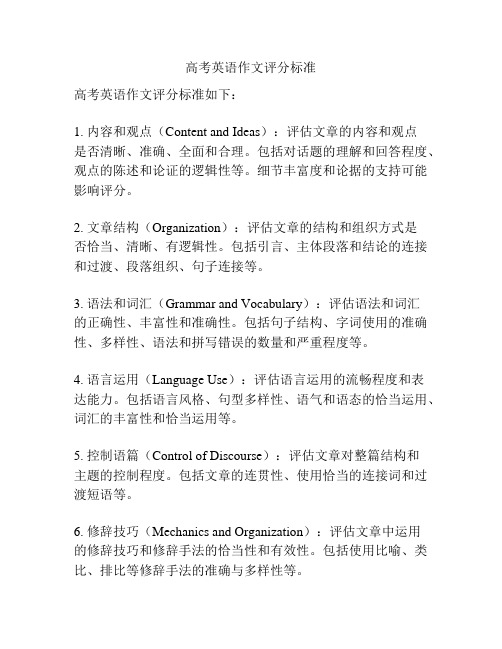
高考英语作文评分标准高考英语作文评分标准如下:1. 内容和观点(Content and Ideas):评估文章的内容和观点是否清晰、准确、全面和合理。
包括对话题的理解和回答程度、观点的陈述和论证的逻辑性等。
细节丰富度和论据的支持可能影响评分。
2. 文章结构(Organization):评估文章的结构和组织方式是否恰当、清晰、有逻辑性。
包括引言、主体段落和结论的连接和过渡、段落组织、句子连接等。
3. 语法和词汇(Grammar and Vocabulary):评估语法和词汇的正确性、丰富性和准确性。
包括句子结构、字词使用的准确性、多样性、语法和拼写错误的数量和严重程度等。
4. 语言运用(Language Use):评估语言运用的流畅程度和表达能力。
包括语言风格、句型多样性、语气和语态的恰当运用、词汇的丰富性和恰当运用等。
5. 控制语篇(Control of Discourse):评估文章对整篇结构和主题的控制程度。
包括文章的连贯性、使用恰当的连接词和过渡短语等。
6. 修辞技巧(Mechanics and Organization):评估文章中运用的修辞技巧和修辞手法的恰当性和有效性。
包括使用比喻、类比、排比等修辞手法的准确与多样性等。
7. 英文写作风格(English Language Use):评估学生运用英语的独特风格和对英语表达方式的理解和运用。
包括表达方式的多样性、句子结构的灵活性、句法结构的正确性和准确性等。
以上评分标准可能会根据不同考试机构或学校而有所不同,细节和具体要求也会因题目或作文类型的不同而有所调整。
考生应在了解具体评分标准的基础上,注意对文章结构、语法、词汇和语言运用的准确性和流畅性,以及对观点和论证的清晰度和逻辑性进行考虑和处理。
北京高考英语作文评分标准

北京高考英语作文评分标准1. Content and Completeness (内容与完整性)- Essays are assessed on how well they address the prompt and cover all aspects of the question.- The completeness of the response, including whether all parts of the question are answered, is considered.2. Organization and Coherence (组织与连贯性)- The logical flow of ideas and the overall structure of the essay are evaluated.- Clear introductions, body paragraphs, and conclusions are expected for higher scores.3. Language Use (语言运用)- The use of a wide range of vocabulary and grammatical structures is favored.- Errors in grammar, spelling, and punctuation are penalized, with the severity of the penalty depending on the frequency and impact on comprehension.4. Lexical Resource (词汇资源)- The ability to use appropriate and varied vocabulary to convey meaning effectively is assessed.- Repetition of words and phrases without variation can lower the score.5. Grammatical Range and Accuracy (语法范围与准确性)- A variety of complex sentence structures is expected forhigher grades.- Minor grammatical errors are tolerated, but they should not impede understanding.6. Pronunciation and Spelling (发音与拼写)- While not typically assessed in written essays, if a student's pronunciation or spelling is mentioned or described, it should be accurate.7. Task Response (任务回应)- The essay must respond directly to the task set by the prompt.- Off-topic essays or those that do not follow the instructions will receive lower scores.8. Argumentation and Persuasion (论证与说服)- For argumentative essays, the ability to present a clear and logical argument with supporting evidence is crucial.- The use of persuasive language and techniques is also considered.9. Creativity and Originality (创造性与原创性)- Essays that demonstrate original thought and creativity are often rewarded with higher scores.- Repetitive or formulaic responses tend to score lower.10. Presentation (呈现)- The overall presentation, including handwriting or typing, is taken into account.- Neatness and legibility can contribute to a better impression and potentially a higher score.It's important to note that the Beijing Gaokao English essay grading criteria are subject to change and may be interpreted differently by individual markers. However, these general principles provide a framework for what is typically expected in the grading of essays for this high-stakes examination.。
高考英语作文范文及评分标准

高考英语作文范文及评分标准在高考备考期间,英语写作一定是我们不可避免地要面对的一部分。
而其中关于英语作文的考试就显得格外重要。
在这篇文章中,我们将从高考英语作文范文及评分标准两个方面来深入探讨高考英语作文。
一、高考英语作文范文以下是一篇高考英语作文范文,来自于2017年高考英语作文:Directions: For this part, you are allowed 30 minutes to write a composition on the topic The Advantages and Disadvantages of Taking a Part-time Job. You should write at least 120 words and you should base your composition on the outline (given in Chinese) below:1.很多学生利用课余时间打工。
\n2.打工有什么好处\n3.打工也有坏处。
\n4.我的观点。
The Advantages and Disadvantages of Taking a Part-time JobIn recent years, more and more students choose to find part-time jobs in their spare time. These jobs could be in restaurants, shops,or other businesses. In this essay, the advantages and disadvantages of taking a part-time job will be examined.The advantages of taking a part-time job are many. Firstly, it can provide students with valuable work experience and enhance their employability after graduation. Secondly, it can help supplement students’ living expenses, which is especially important for low-income families. Thirdly, it allows students to learn how to balance their work and study, which develops their time-management skills.However, there are some disadvantages to taking a part-time job. Firstly, students may neglect their studies when they work too much. Secondly, students may not learn the necessary work skills due to poorly managed businesses. Thirdly, students may be exposed to bad influences from colleagues, especially when the business is involved in illegal or immoral behavior.In my opinion, taking a part-time job has many benefits, but it is important to find a balance between work and study. Students should prioritize their studies, and avoid working too much so that school work is not neglected. Businesses should also operate in aresponsible manner to ensure that their employees receive a good working environment.该篇作文不仅符合高考作文的要求,更重要的是,它展示了作者很好的英语写作能力。
高考作文之浙江省高考英语作文评分标准
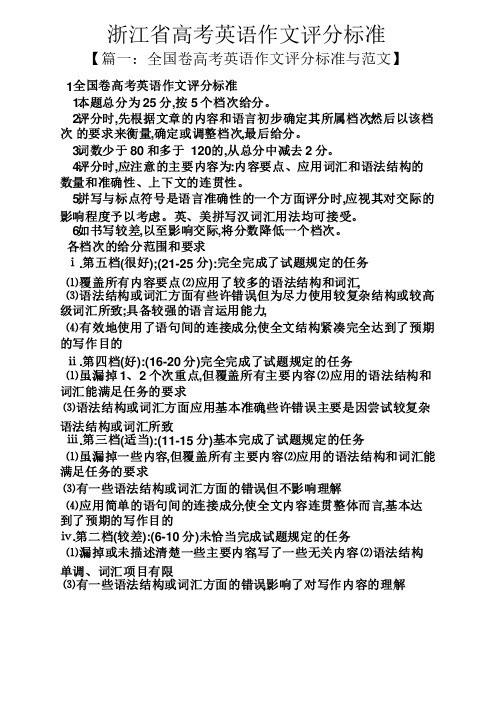
浙江省高考英语作文评分标准【篇一:全国卷高考英语作文评分标准与范文】1全国卷高考英语作文评分标准1.本题总分为25分,按5个档次给分。
2.评分时,先根据文章的内容和语言初步确定其所属档次,然后以该档次的要求来衡量,确定或调整档次,最后给分。
3.词数少于80和多于120的,从总分中减去2分。
4.评分时,应注意的主要内容为:内容要点、应用词汇和语法结构的数量和准确性、上下文的连贯性。
5.拼写与标点符号是语言准确性的一个方面,评分时,应视其对交际的影响程度予以考虑。
英、美拼写汉词汇用法均可接受。
6.如书写较差,以至影响交际,将分数降低一个档次。
各档次的给分范围和要求ⅰ.第五档(很好);(21-25分):完全完成了试题规定的任务⑴覆盖所有内容要点⑵应用了较多的语法结构和词汇,⑶语法结构或词汇方面有些许错误,但为尽力使用较复杂结构或较高级词汇所致;具备较强的语言运用能力,⑷有效地使用了语句间的连接成分,使全文结构紧凑完全达到了预期的写作目的ⅱ.第四档(好):(16-20分)完全完成了试题规定的任务⑴虽漏掉1、2个次重点,但覆盖所有主要内容⑵应用的语法结构和词汇能满足任务的要求⑶语法结构或词汇方面应用基本准确,些许错误主要是因尝试较复杂语法结构或词汇所致ⅲ.第三档(适当):(11-15分)基本完成了试题规定的任务⑴虽漏掉一些内容,但覆盖所有主要内容⑵应用的语法结构和词汇能满足任务的要求⑶有一些语法结构或词汇方面的错误,但不影响理解⑷应用简单的语句间的连接成分,使全文内容连贯整体而言,基本达到了预期的写作目的ⅳ.第二档(较差):(6-10分)未恰当完成试题规定的任务⑴漏掉或未描述清楚一些主要内容,写了一些无关内容⑵语法结构单调、词汇项目有限⑶有一些语法结构或词汇方面的错误,影响了对写作内容的理解⑷较少使用语句间的连接成分,内容缺少连贯性信息未能清楚地传达给读者 nbsp; ⅴ.第一档(差):(1-5分)未完成试题规定的任务 ⑴明显遗漏主要内容,写了一些无关内容,原因可能是未理解试题要求⑵语法结构单调、词汇项目有限⑶较多语法结构或词汇方面的错误,影响对写作内容的理解⑷缺乏语句间的连接成分,内容不连贯信息未能传达给读者。
高考英语作文评分标准是什么

高考英语作文评分标准是什么
高考英语作文的评分标准是能否准确运动语法、词汇、拼写、标点等。
在使用一些句型、短句的时候,能不能够清楚表达自己的意思,从而写出流畅易懂得作文。
高考英语作文在评分的时候,主要从内容要点、运动词汇和语法结构的数量、词汇的
准确运动和句子的结构把握、上下文的连贯性等四个方面进行考虑。
如果你的书写很差,影响正常的阅读,会将分数降低一个档次。
英语作文内容太少,阅卷教师无法进行评判的,或者是写作内容和作文要求无关的,
这类作文基本不会给分。
没有完成作文规定的任务、遗漏了主要内容或者是偏题、语言的结构非常单调、词汇
项目少、语法中错误较多等,这类作文属于第一档(差),阅卷教师会给1-5分。
第二档(较差):较少使用语法,内容之间缺少连贯性,不能把自己写的内容准确的
传达给读者,阅卷老师一般会给6-10分。
第三档(适当):就作文整体而言,达到了学写作的目的地;文中应用的都是一些简
单的语句;虽然有语法和词汇的错误,但是不影响读者理解,这类作文一般会给11-15分。
第四档(好,16-20分):可能会漏掉一两个重点的内容,但是整篇作文覆盖了主要内容,语法也能够满足作文规定。
第五档(很好,21-25分):很好的完成了人物并且作文覆盖所有内容要点,应用的
词汇很多,在语法和词汇上的错误很少,能够完全达到写作目的。
感谢您的阅读,祝您生活愉快。
高考英语作文评分标准

高考英语作文评分标准第五档(很好):(21~25分)1.完全完成了试题规定的任务。
2.覆盖所有内容要点。
3.应用了较多的语法结构和词汇。
4.语法结构或词汇方面有些许错误,但为尽力使用较复杂结构或较高级词汇所致;具备较强的语言运用能力。
5.有效地使用了语句间的连接成分,使全文结构紧凑。
6.完全达到了预期的写作目的。
第四档(好):(16~20分)1.完全完成了试题规定的任务。
2.虽漏掉1、2个次重点,但覆盖所有主要内容。
3.应用的语法结构和词汇能满足任务的要求。
4.语法结构或词汇方面应用基本准确,些许错误主要是因尝试较复杂语法结构或词汇所致。
5.应用简单的语句间的连接成分,使全文结构紧凑。
6.达到了预期的写作目的。
第三档(适当):(11~15分)1.基本完成了试题规定的任务。
2.虽漏掉一些内容,但覆盖所有主要内容。
3.应用的语法结构和词汇能满足任务的要求。
4.有一些语法结构或词汇方面的错误,但不影响理解。
5.应用简单的语句间的连接成分,使全文内容连贯。
6.整体而言,基本达到了预期的写作目的。
第二档(较差):(6-10分)1.未恰当完成试题规定的任务。
2.漏掉或未描述清楚一些主要内容,写了一些无关内容。
3.语法结构单调、词汇项目有限。
4.有一些语法结构或词汇方面的错误,影响了对写作内容的理解。
5.较少使用语句间的连接成分,内容缺少连贯性。
6.信息未能清楚地传达给读者。
第一档(差):(1~5分)1.未完成试题规定的任务。
2.明显遗漏主要内容,写了一些无关内容,原因可能是未理解试题要求。
3.语法结构单调、词汇项目有限。
4.较多语法结构或词汇方面的错误,影响对写作内容的理解。
5.缺乏语句间的连接成分,内容不连贯。
6.信息未能传达给读者。
不得分:(0分)。
高考英语作文评分标准细则
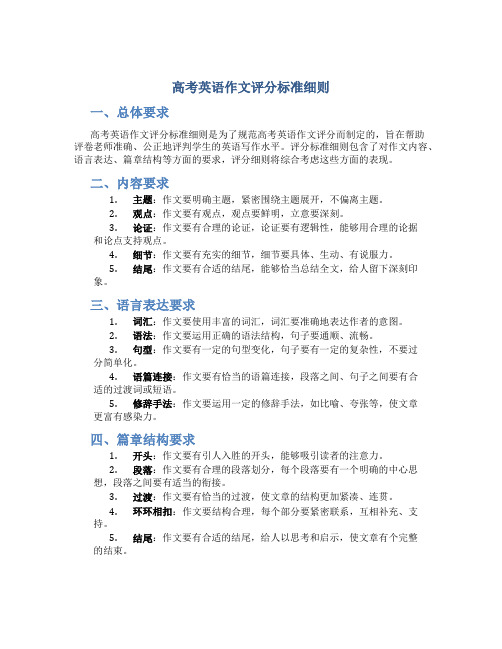
高考英语作文评分标准细则一、总体要求高考英语作文评分标准细则是为了规范高考英语作文评分而制定的,旨在帮助评卷老师准确、公正地评判学生的英语写作水平。
评分标准细则包含了对作文内容、语言表达、篇章结构等方面的要求,评分细则将综合考虑这些方面的表现。
二、内容要求1.主题:作文要明确主题,紧密围绕主题展开,不偏离主题。
2.观点:作文要有观点,观点要鲜明,立意要深刻。
3.论证:作文要有合理的论证,论证要有逻辑性,能够用合理的论据和论点支持观点。
4.细节:作文要有充实的细节,细节要具体、生动、有说服力。
5.结尾:作文要有合适的结尾,能够恰当总结全文,给人留下深刻印象。
三、语言表达要求1.词汇:作文要使用丰富的词汇,词汇要准确地表达作者的意图。
2.语法:作文要运用正确的语法结构,句子要通顺、流畅。
3.句型:作文要有一定的句型变化,句子要有一定的复杂性,不要过分简单化。
4.语篇连接:作文要有恰当的语篇连接,段落之间、句子之间要有合适的过渡词或短语。
5.修辞手法:作文要运用一定的修辞手法,如比喻、夸张等,使文章更富有感染力。
四、篇章结构要求1.开头:作文要有引人入胜的开头,能够吸引读者的注意力。
2.段落:作文要有合理的段落划分,每个段落要有一个明确的中心思想,段落之间要有适当的衔接。
3.过渡:作文要有恰当的过渡,使文章的结构更加紧凑、连贯。
4.环环相扣:作文要结构合理,每个部分要紧密联系,互相补充、支持。
5.结尾:作文要有合适的结尾,给人以思考和启示,使文章有个完整的结束。
五、评分细则根据作文的内容、语言表达、篇章结构等方面的要求,评分细则如下:评分要素描述分值内容要素主题明确,观点鲜明,论证合理,细节充实,结尾恰当40语言要素词汇丰富,语法准确,句子流畅,语篇连贯,修辞得当30篇章结构开头吸引,段落划分合理,过渡恰当,环环相扣,结尾完整20书写规范字迹清晰、工整,段落格式清晰,标点符号正确10六、总结高考英语作文评分标准细则旨在为评卷老师提供明确的评分要求,使评分更加准确、公正。
江苏高考英语作文评分标准

学习必备欢迎下载各档次的给分范围和要求第五档(很好):(21—25分)1.完全完成了试题规定的任务。
2.覆盖所有内容要点。
3.应用了较多的语法结构和词汇。
4.语法结构或词汇方面有些许错误,但为尽力使用较复杂结构或较高级词汇所致;具备较强的语言运用能力。
5.有效地使用了语句间的连接成分,使全文结构紧凑。
6.完全达到了预期的写作目的。
第四档(好):(16—20分)1.完全完成了试题规定的任务。
2.虽漏掉1、2个次重点,但覆盖所有主要内容。
3.应用的语法结构和词汇能满足任务的要求。
4.语法结构或词汇方面应用基本准确,些许错误主要是因尝试较复杂语法结构或词汇所致。
5.应用简单的语句间的连接成分,使全文结构紧凑。
6.达到了预期的写作目的。
第三档(适当):(11—15分)1.基本完成了试题规定的任务。
2.虽漏掉一些内容,但覆盖所有主要内容。
3.应用的语法结构和词汇能满足任务的要求。
4.有一些语法结构或词汇方面的错误,但不影响理解。
5.应用简单的语句间的连接成分,使全文内容连贯。
6.整体而言,基本达到了预期的写作目的。
第二档(较差):(6—10分)1.未恰当完成试题规定的任务。
2.漏掉或未描述清楚一些主要内容,写了一些无关内容。
3.语法结构单调、词汇项目有限。
4.有一些语法结构或词汇方面的错误,影响了对写作内容的理解。
5.较少使用语句间的连接成分,内容缺少连贯性。
6.信息未能清楚地传达给读者。
第一档(差):(1—5分)1.未完成试题规定的任务。
2.明显遗漏主要内容,写了一些无关内容,原因可能是未理解试题要求。
3.语法结构单调、词汇项目有限。
4.较多语法结构或词汇方面的错误,影响对写作内容的理解。
5.缺乏语句间的连接成分,内容不连贯。
6.信息未能传达给读者。
不得分:(0分)未能传达给读者任何信息:内容太少,无法评判;写的内容均与所要求内容无关或所写内容无法看清。
书面表达:1.本题总分为25分,按5个档次给分。
2.评分时,先根据文章的内容和语言(内容要点、应用词汇和语法结构的数量和准确性、上下文的连贯性及语言的得体性) 初步确定其所属档次,然后以该档次的要求来衡量,确定或调整档次,最后给分。
高考英语书面表达高分指南
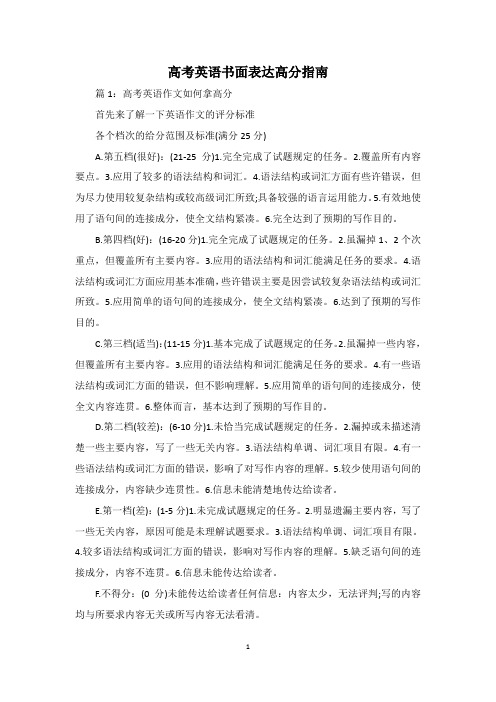
高考英语书面表达高分指南篇1:高考英语作文如何拿高分首先来了解一下英语作文的评分标准各个档次的给分范围及标准(满分25分)A.第五档(很好):(21-25分)1.完全完成了试题规定的任务。
2.覆盖所有内容要点。
3.应用了较多的语法结构和词汇。
4.语法结构或词汇方面有些许错误,但为尽力使用较复杂结构或较高级词汇所致;具备较强的语言运用能力。
5.有效地使用了语句间的连接成分,使全文结构紧凑。
6.完全达到了预期的写作目的。
B.第四档(好):(16-20分)1.完全完成了试题规定的任务。
2.虽漏掉1、2个次重点,但覆盖所有主要内容。
3.应用的语法结构和词汇能满足任务的要求。
4.语法结构或词汇方面应用基本准确,些许错误主要是因尝试较复杂语法结构或词汇所致。
5.应用简单的语句间的连接成分,使全文结构紧凑。
6.达到了预期的写作目的。
C.第三档(适当):(11-15分)1.基本完成了试题规定的任务。
2.虽漏掉一些内容,但覆盖所有主要内容。
3.应用的语法结构和词汇能满足任务的要求。
4.有一些语法结构或词汇方面的错误,但不影响理解。
5.应用简单的语句间的连接成分,使全文内容连贯。
6.整体而言,基本达到了预期的写作目的。
D.第二档(较差):(6-10分)1.未恰当完成试题规定的任务。
2.漏掉或未描述清楚一些主要内容,写了一些无关内容。
3.语法结构单调、词汇项目有限。
4.有一些语法结构或词汇方面的错误,影响了对写作内容的理解。
5.较少使用语句间的连接成分,内容缺少连贯性。
6.信息未能清楚地传达给读者。
E.第一档(差):(1-5分)1.未完成试题规定的任务。
2.明显遗漏主要内容,写了一些无关内容,原因可能是未理解试题要求。
3.语法结构单调、词汇项目有限。
4.较多语法结构或词汇方面的错误,影响对写作内容的理解。
5.缺乏语句间的连接成分,内容不连贯。
6.信息未能传达给读者。
F.不得分:(0分)未能传达给读者任何信息:内容太少,无法评判;写的内容均与所要求内容无关或所写内容无法看清。
湖南高考英语作文评分标准及满分作文详解

湖南高考英语作文评分标准及满分作文详解Section C(25 marks)Directions: write an English composition according to the instructions given below.请你下列词语为关键词写一篇英语短文,match winner loser result内容:1.自己或他人的一次经历2.你的感受注意:1.必须使用所给的4个关键词;2.次数不少于120词;3.不能使用真实姓名和学校。
湖南高考英语作文评分细则评分角度主题评分要点比赛(match)1、有输赢结果的活动2、可具体,可抽象评分标准及细则1、空白(含仅写几个词或短语)计0分2、跑题(与主题完全无关,这通常是整篇抄袭试卷原文的结果)计0分3、完全不用英语(如用中文或汉语拼音)作答,计0分4、切题的,依照“内容”和“形式”定档计分内容15’1、有经历描写2、有情感抒发注意: 1、切题指紧扣主题,描了自己或他人的一次比赛(match)活动,有感受抒发,直接使用了4个关键词,使用了所给关键词的同义说近义词的不算跑题2、对于内容切题而语言表达特别差的,按内容给分,最高记15分3、对于内容不太顺但语言表达很好的文章,按形式给分,最高计10分4、异常卷(如雷同,卷面无法辨认)转交学科组处理形式10’1、词汇2、语法3、衔接及连贯其他1、词数2、书写3、卷面1、词数不达标(明显少于12行,即剩余四行)扣1分2、书写特别工整,卷面特别整洁加1分3、书写一般,但基本能辨认,不要降档给分4、书写漂亮,不可随意凭印象提高档次给分分数档五档: 完全达到交际目的(perfect communication)21-25’1. 充分具体涵盖所有的内容要点2. 语法结构使用广泛,准确而灵活,用词丰富而地道,句际及段际衔接自然,紧密,语义连贯3. 极少出现小错误,如标点,单复数,大小写等。
四档:有效达到交际目的(proper communication)16-20’1. 完全而具体地涵盖所有要点2. 语法结构使用丰富,正确而自然,词汇使用多样而流畅,信息和观点安排有序,分段充分,适当3. 有少数小错误三档:基本达标(passable communication)11-15’1. 涵盖所有内容要点2. 多数词句语法结构正确,使用交际词汇量,信息和观点有一定组织性,但缺少整体延续性3. 语法,拼写,衔接及标点错误多,导致难以理解。
高考英语作文评分标准细则

高考英语作文评分标准细则高考英语作文是考生综合语言运用能力的重要考核项目,评分标准的明确与规范对于考生的备考和教师的教学都具有重要意义。
下面将详细介绍高考英语作文评分标准的细则,希望对广大考生和教师有所帮助。
一、内容要点。
1. 内容完整,要求考生围绕所给话题进行论述,不得偏离主题,确保内容完整。
2. 观点明确,要求考生表达清晰的观点和态度,不得模棱两可或含糊其辞。
3. 论据充分,要求考生能够用具体的事实、数据或例子来支撑自己的观点,论证充分。
二、语言表达。
1. 词汇运用,要求考生能够使用丰富的词汇,避免重复和低级错误。
2. 句式多样,要求考生能够灵活运用多种句式,避免句式单一和呆板。
3. 语法准确,要求考生能够避免语法错误,包括但不限于主谓不一致、时态错误等。
三、逻辑结构。
1. 开头自然,要求考生开头自然,引出话题,不得生硬或突兀。
2. 衔接流畅,要求考生各段落之间的衔接流畅,不得呈现逻辑断裂或跳跃。
3. 结尾得当,要求考生结尾得当,有总结性质,不得突然收尾或拖泥带水。
四、篇章连贯。
1. 段落层次,要求考生能够使用恰当的段落标志,确保段落层次清晰。
2. 衔接词语,要求考生能够使用适当的衔接词语,确保段落和句子之间的连贯性。
3. 整体连贯,要求考生整篇文章的结构和内容连贯,不得呈现支离破碎或离题偏离的情况。
五、书写规范。
1. 字迹工整,要求考生的书写工整,不得出现潦草涂改或难以辨认的情况。
2. 标点规范,要求考生的标点使用规范,不得出现错漏标点的情况。
3. 字数适当,要求考生的字数符合要求,不得超出或不足。
通过以上细则的介绍,相信考生和教师对高考英语作文评分标准有了更清晰的认识。
希望广大考生在备考过程中,能够充分理解并严格遵守评分标准,以取得更好的成绩。
同时,希望教师们能够结合评分标准,进行有针对性的指导和训练,帮助学生提高作文水平。
祝愿所有考生取得理想的成绩!。
2023高考英语作文评分标准细则有哪些

2023高考英语作文评分标准细则有哪些2023高考英语作文要求考生能清楚表达事实、观点、情感、和想象内容。
要求做到正确拼写单词、准确运用语法和词汇、灵活运用句型和词汇,清楚、连贯地表达思想、逻辑清晰、词句表达高级、内容具体。
1高考作文评分的标准1、高考英语作文总分为25分,按5个档次给分2、评分时,先根据文章的内容和语言初步确定是否达到及格线(15分),然后确定其所属的具体档次,以该档次的要求来衡量,最后给分。
其所属档次,然后以该档次的要求来衡量,确定或调整档次,最后给分。
3、高考英语作文词数少于80和多于120的,从总分中减去2分。
4、高考英语作文评分时应注意的主要内容为:内容要点、应用词汇和语法结构的丰富性和准确性及上下文的连贯性。
5、若缺少要点,分数降一档处理。
6、拼写与标点符号是语言准确性的一个方面。
高考英语作文评分时应视其对交际的影响程度予以考虑。
英、美拼写及词汇用法均可接受。
7、书写较差以至于影响交际,高考英语作文将其分数降低一个档次。
2英语作文高分书面表达具备的特点1、英语作文首先要做到卷面清爽,尽量减少修改卷面整洁的高考英语作文分数一般都不会太低,阅卷老师喜好阅读字迹工整的文章,让人看上去舒服的卷面,应尽量减少修改,如果字体优美的话就更占优势了。
2、杜绝错误拼写高考英语作文应杜绝拼写错误的单词,尤其是简单的词汇。
如果考生有拿不准的单词应尽量替换为熟悉的单词。
如果有拼写错误的单词不仅会因此扣分,还会影响整体英语作文分数的等级。
3、作文内容具体:高考英语作文内容要点齐全,清楚地表达了自己的观点并进行了充分合理的论证;4、词句表达高级,准确性高,描述恰当。
高考英语作文时态、人称符合文章要求,英语语法、英语句法准确无误,结构严谨,标点、格式、大小写亦能正确应用;5、逻辑清晰。
连贯性好,衔接语使用恰当,英语作文结构紧凑;作文中如果使用了一些较为复杂的词汇,句式,能体现出较强的语言运用能力;。
高考英语作文评分标准_解析
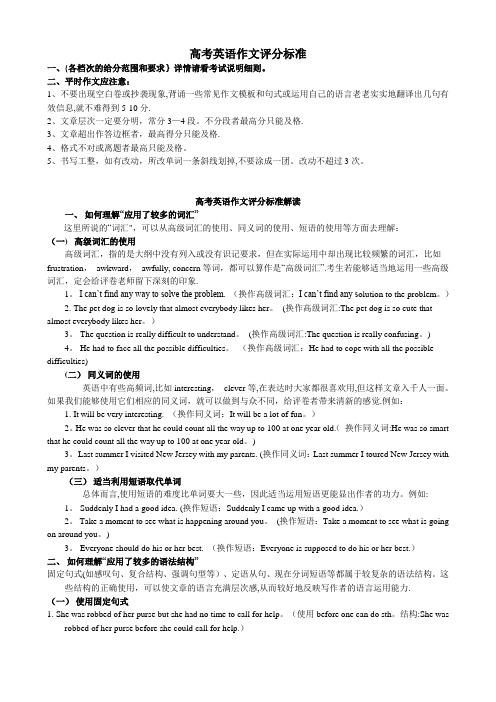
高考英语作文评分标准一、{各档次的给分范围和要求}详情请看考试说明细则。
二、平时作文应注意:1、不要出现空白卷或抄袭现象,背诵一些常见作文模板和句式或运用自己的语言老老实实地翻译出几句有效信息,就不难得到5-10分.2、文章层次一定要分明,常分3—4段。
不分段者最高分只能及格.3、文章超出作答边框者,最高得分只能及格.4、格式不对或离题者最高只能及格。
5、书写工整,如有改动,所改单词一条斜线划掉,不要涂成一团。
改动不超过3次。
高考英语作文评分标准解读一、如何理解“应用了较多的词汇”这里所说的“词汇",可以从高级词汇的使用、同义词的使用、短语的使用等方面去理解:(一) 高级词汇的使用高级词汇,指的是大纲中没有列入或没有识记要求,但在实际运用中却出现比较频繁的词汇,比如frustration,awkward,awfully, concern等词,都可以算作是“高级词汇”.考生若能够适当地运用一些高级词汇,定会给评卷老师留下深刻的印象.1。
I can’t find any way to solve the problem. (换作高级词汇:I can’t find any s olution to the problem。
)2. The pet dog is so lovely that almost everybody likes her。
(换作高级词汇:The pet dog is so cute that almost everybody likes her。
)3。
The question is really difficult to understand。
(换作高级词汇:The question is really confusing。
) 4。
He had to face all the possible difficulties。
(换作高级词汇:He had to cope with all the possible difficulties)(二)同义词的使用英语中有些高频词,比如interesting,clever等,在表达时大家都很喜欢用,但这样文章入千人一面。
(完整版)全国卷高考英语作文评分标准
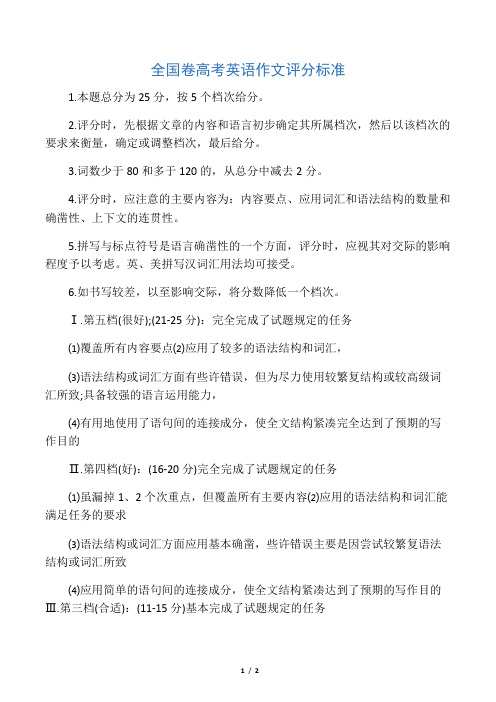
全国卷高考英语作文评分标准1.本题总分为25分,按5个档次给分。
2.评分时,先根据文章的内容和语言初步确定其所属档次,然后以该档次的要求来衡量,确定或调整档次,最后给分。
3.词数少于80和多于120的,从总分中减去2分。
4.评分时,应注意的主要内容为:内容要点、应用词汇和语法结构的数量和确凿性、上下文的连贯性。
5.拼写与标点符号是语言确凿性的一个方面,评分时,应视其对交际的影响程度予以考虑。
英、美拼写汉词汇用法均可接受。
6.如书写较差,以至影响交际,将分数降低一个档次。
Ⅰ.第五档(很好);(21-25分):完全完成了试题规定的任务⑴覆盖所有内容要点⑵应用了较多的语法结构和词汇,⑶语法结构或词汇方面有些许错误,但为尽力使用较繁复结构或较高级词汇所致;具备较强的语言运用能力,⑷有用地使用了语句间的连接成分,使全文结构紧凑完全达到了预期的写作目的Ⅱ.第四档(好):(16-20分)完全完成了试题规定的任务⑴虽漏掉1、2个次重点,但覆盖所有主要内容⑵应用的语法结构和词汇能满足任务的要求⑶语法结构或词汇方面应用基本确凿,些许错误主要是因尝试较繁复语法结构或词汇所致⑷应用简单的语句间的连接成分,使全文结构紧凑达到了预期的写作目的Ⅲ.第三档(合适):(11-15分)基本完成了试题规定的任务⑴虽漏掉一些内容,但覆盖所有主要内容⑵应用的语法结构和词汇能满足任务的要求⑶有一些语法结构或词汇方面的错误,但不影响理解⑷应用简单的语句间的连接成分,使全文内容连贯整体而言,基本达到了预期的写作目的Ⅳ.第二档(较差):(6-10分)未恰当完成试题规定的任务⑴漏掉或未描述清晰一些主要内容,写了一些无关内容⑵语法结构单调、词汇项目无限⑶有一些语法结构或词汇方面的错误,影响了对写作内容的理解⑷较少使用语句间的连接成分,内容缺少连贯性信息未能清晰地传达给读者Ⅴ.第一档(差):(1-5分)未完成试题规定的任务⑴明明遗漏主要内容,写了一些无关内容,原因可能是未理解试题要求⑵语法结构单调、词汇项目无限⑶较多语法结构或词汇方面的错误,影响对写作内容的理解⑷缺乏语句间的连接成分,内容不连贯信息未能传达给读者。
- 1、下载文档前请自行甄别文档内容的完整性,平台不提供额外的编辑、内容补充、找答案等附加服务。
- 2、"仅部分预览"的文档,不可在线预览部分如存在完整性等问题,可反馈申请退款(可完整预览的文档不适用该条件!)。
- 3、如文档侵犯您的权益,请联系客服反馈,我们会尽快为您处理(人工客服工作时间:9:00-18:30)。
高考英语作文评分标准一般来说,写作题的高考评分标准包含评分原则、内容要点、给分范围及要求、说明和参考范文五个部分。
其中内容要点以及词数、标点、书写等方面的原则比较容易理解、操控和落实。
但“评分时,应该注意的主要内容为……应用词汇和语法结构的数量……上下文的连贯性和语言的得体性”等评分原则,“应用了较多的语法结构和词汇;语法结构或词汇方面有些许错误,但为尽力使用较复杂结构或较高级词汇所致,具备较强的语言运用能力;有效地使用了语句间的连接成份,使全文结构紧凑”等给分要求、以及“对紧扣主题的适当发挥不予扣分”等说明,相对比较抽象,不易捉摸。
一、如何理解“应用了较多的词汇”这里所说的“词汇”,可以从高级词汇的使用、同义词的使用、短语的使用等方面去理解:(一) 高级词汇的使用评分标准第五档次的要求中提到,“词汇方面有些许错误,但为尽力使用较复杂结构或较高级词汇所致”。
这里所说的“高级词汇”,指的是大纲中没有列入或没有识记要求,但在实际运用中却出现比较频繁的词汇,比如frustration, awkward, awfully, concern等词,都可以算作是“高级词汇”。
考生若能够适当地运用一些高级词汇,定会给评卷老师留下深刻的印象。
1. I can’t find any way to solve the probl em.改进:I can’t find any solution to the probl em.2. The pet d og is so l ovely that almost everybody likes her.改进:The pet d og is so cute that almost everybody likes her.3. The question is really difficult to understand.改进:The question is really confusing.4. He had to face all the possible difficulties.改进:He had to cope with all the possible difficulties.(二) 同义词的使用英语中有些词的使用频率非常高,比如interesting, clever等,在表达时大家都很喜欢用,这样很容易令文章入千人一面的窘境中。
但如果我们能够使用它们相应的同义词,就可以做到与众不同,给评卷者带来清新的感觉。
例如:1. It will be very interesting.改进:It will be a lot of fun.2. He was so clever that he coul d count all the way up to 100 at one year old.改进:He was so smart that he could count all the way up to 100 at one year old.3. Last summer I visited New Jersey with my parents.改进:Last summer I toured New Jersey with my parents.(三) 适当利用短语取代单词总体而言,使用短语的难度比单词要大一些,因此适当运用短语更能显出作者的功力。
例如:1. Sud denly I had a good idea.改进:Sud denly I came up with a good idea.2. Take a moment to see what is happening around you.改进:Take a moment to see what is going on around you.3. Everyone should do his or her best.改进:Everyone is supposed to do his or her best.二、如何理解“应用了较多的语法结构”固定句式(如感叹句、复合结构、强调句型等)、定语从句、现在分词短语等都属于较复杂的语法结构。
这些结构的正确使用,可以使文章的语言充满层次感,从而较好地反映写作者的语言运用能力。
(一) 使用固定句式1. She was robbed of her purse but she had no time to call for help.改进:使用before one can do sth.结构:She was robbed of her purse before she coul d call for help.2. The environment will never improve until everybody takes care of it.改进:使用倒装结构:Not until everybody takes care of it will the environment improve.(二) 使用现在分词结构现在分词结构可以表达伴随、原因等状语,因此几乎在任何文章中都可以用得上。
现在分词短语可以使句子的表达更加简洁、生动,而且也使前后两个动作的衔接更加紧密。
例如:1. Nowadays, we can easily travel from one place to another and this bridges the gap among different races or cultures. 改进:Nowadays, we can easily travel from one place to another, thus bridging the gap among different race or cultures.2. People worked together on the assembly line.改进:People worked together on the assembly line, moving quickly and efficiently.(三) 使用定语从句定语从句的使用,不仅能使上下文更加流畅,也同时能充分展示写作者运用较复杂的语法结构的能力。
例如:1. My favorite living writer is Rud dy Doyle. I think he is a genius.改进:My favorite living writer is Ruddy Doyl e, who I think is a genius.2. My aunt bought me a book. The titl e of the book is All about USA.改进:My aunt bought me a book, whose title is All about the USA.三、如何理解“上下文的连贯性”评分标准指出,书面表达应该注意“上下文的连贯性”,并能“有效地使用语句间的连接成份,使全文结构紧凑”。
这里说的连贯性,就是指通过连接词(包括并列连词,从属连词和连接性副词)、非谓语动词短语等语法成分,使两个或多个意义相互关联的事情或观点在同一个句子内得以表达,从而使整个段落或篇章浑然一体,连贯流畅。
(一) 连接性副词连接性副词也被称为过渡词。
它们的位置一般以句首居多。
连接性副词承上启下,能够令读者对后续的句子产生心理上的期待和准备,因此整个篇章会因它们而紧凑连贯。
常见的连接性副词有:also, furthermore, in addition, additionally, hopefully, meanwhile, however, instead, in other words, in brief, in a word, in my opinion, on the whol e等等。
例如:1. We have many things to d o. We believe we can finish before the day is over.使用连接性副词:We have quite a lot to d o. Hopefully, we will be able to finish before the day is over.2. The boy comes from a poor family. The boy does very well in his studies. The boy plans to work his way through college.使用连接性副词:Even though he comes from a poor family, the boy does very well in his studies; furthermore, he plans to work his way through coll ege.(二) 使用从属连词常见的从属连词有after, as, when, while, as long as, as soon as等。
例如:1. You work hard and never give up. You will succeed in your studies.使用从属连词:So long as you work hard, you will succeed in your studies.2. The teacher came in. the students were quiet.使用从属连词:The stud ents were quiet as soon as the teacher came in.四、如何理解“语言的得体性”评分标准要求考生应注意“语言得体性”,就是要求在表达时根据说话的对象、时间、地点、场合等因素来选择使用恰当的英语语言。
(一) 体裁和题材对得性的要求不同体裁和题材的文章有不同的用语要求。
比如,书面通知中就不适合用“I will tell you a piece of good news.”或“May I have your attention, please?”等句子。
这些句子只有在口头通知中才算得体的语句。
2003年高考的书面表达要求“你”给一位外国朋友回信,介绍“你”帮他找的一套出租房。
相当一部分考生没有理解“你”与说话对象的关系,所以话语中没有给对方提出异议的余地,叙述的方式和口吻上缺乏礼貌性,像“The house is very suitable for you.”等语句显得相当主观,若改为“Do you think it is suitable for you? If not, I will try again.”就比较得体。
